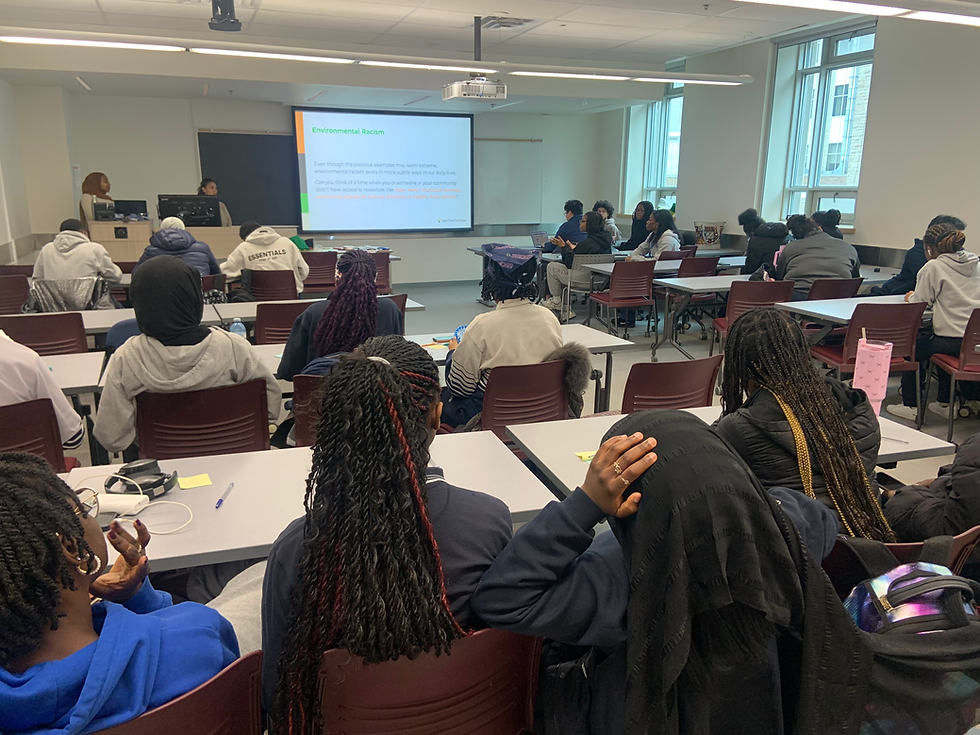Empowering Students to be Agents of Change Through Community-Based Learning
- Madeleine Graham
- Nov 22, 2021
- 4 min read
By: Madeleine Graham (Volunteer with Up4 The Challenge and B. Ed Candidate at University of Ottawa)
“In problem-posing education, people develop their power to perceive critically the way they exist in the world with which and in which they find themselves; they come to see the world not as a static reality, but as a reality in process, in transformation.”- Paulo Freire
Problem-posing education, human-centered design, community-based learning, these are all ways of learning that aspire to push instruction out of it’s traditional distinct and separate subject areas and into real-world, interdisciplinary problem-solving. Community-based learning engages students in bridging the knowledge that comes from interacting with members of their community as well as the knowledge that they are learning in the classroom (Boullion & Gomez, 2001). These two types of knowledge converge with real-world problem solving that can have tangible social impacts.

Up4 the Challenge is a STEM education organization with a focus on inclusion and creativity and a mission to highlight the potential of STEM as an agent of positive social change, using perspectives from the community to create innovative and sustainable solutions to real-world problems.
Community-based learning is a valuable instruction process to achieve this mission and to direct the attention of students to the relevance of learning STEM material.
A common phrase heard in classrooms from elementary school to high school is “will I need to know this for the test?”or “when will I ever need to use this information again?”
When instruction in the classroom is disconnected from the student’s outside experiences in their communities, it can be difficult to make the connections as to the relevance of the material that is being learned and can result in students memorizing information for assessment but not making further links to possible applications.
When students are encouraged to work towards solving a problem that impacts them personally or people in their community, the knowledge they acquire in the classroom becomes more relevant and they can see the impact that their designs can have.
To quote one of our former program facilitators Smyrna Wright, “STEM is not only about numbers and calculations, or hard equations that I don’t understand. There’s a human-ness to it, there’s a creativity to it that’s important and it impacts my daily life.”
Community-based learning is also an avenue of education that fosters creativity and inclusion of diverse perspectives. When solving real-world problems that are open-ended and have no single, specific solution, students are able to collaborate with those who have lived-experience and be empowered that there is space to brainstorm and propose ideas without needing to follow specific rules.

Up4 The Challenge has worked with many community partners including the Parkdale Food Center in Ottawa and Evergreen Brick Works in Toronto. In conducting interviews with community members at the beginning of the design process, the students are rooted in the context of those they are working with and are able to hear about the needs of the community. They begin to understand how change can happen and how they can apply their STEM knowledge in creating solutions. In creating “How might we…” statements, students brainstorm without any constraints of answers being right or wrong but instead understand that there are many ways to go about tackling a problem. After creating an idea for a prototype, students analyze the social impacts of their product and think about how that solution is rooted in the multitude of STEM fields.
In using this approach, diverse perspectives and ideas come together and all who are involved gain a wider perspective of the issue at hand. This type of learning fosters collaboration, critical thinking, and creativity as students are empowered that they can be agents of change in their community. Smyrna expresses it this way; “When I’m doing work that I know goes directly back to people of my community, I have so much passion and greater will to do the work and do it well. I want to impress them and I want to do good things for them because I am with them”.
This past Saturday, November 13th, I was able to help facilitate an Up4 The Challenge workshop with students in grades 7-10 from the Greater Toronto Area. We discussed as a group what the needs and barriers associated with climate change were for the people in each of our communities and had some amazing conversations about how to find sustainable solutions for growing food locally and reducing energy consumption. I was inspired by the creativity and diversity of ideas that the students brought to the table and their ability to connect their knowledge of STEM concepts to the world they saw around them. As a facilitator and a future science teacher, I learned from this experience the importance of bridging classroom knowledge to the lived experience of the students and to empower them as agents of change in their own communities.
When asked about one of her main takeaways from the programming, Devany MacDonald, another facilitator, shared “Working on the workshop has confirmed for me how important it is to talk to people, ask people whether or not it’s working for them. Just the importance of getting real concrete ideas and perspectives from people.” Community-based learning is a key strategy in STEM education and all of us at Up4 The Challenge are excited to walk alongside today’s youth as they work to understand human-centred design and think about a more sustainable and accessible society for all.
Sources:
Bouillion, L.M. and Gomez, L.M. (2001), Connecting school and community with science learning: Real world problems and school–community partnerships as contextual scaffolds. J. Res. Sci. Teach., 38: 878-898. https://doi.org/10.1002/tea.1037







Comments